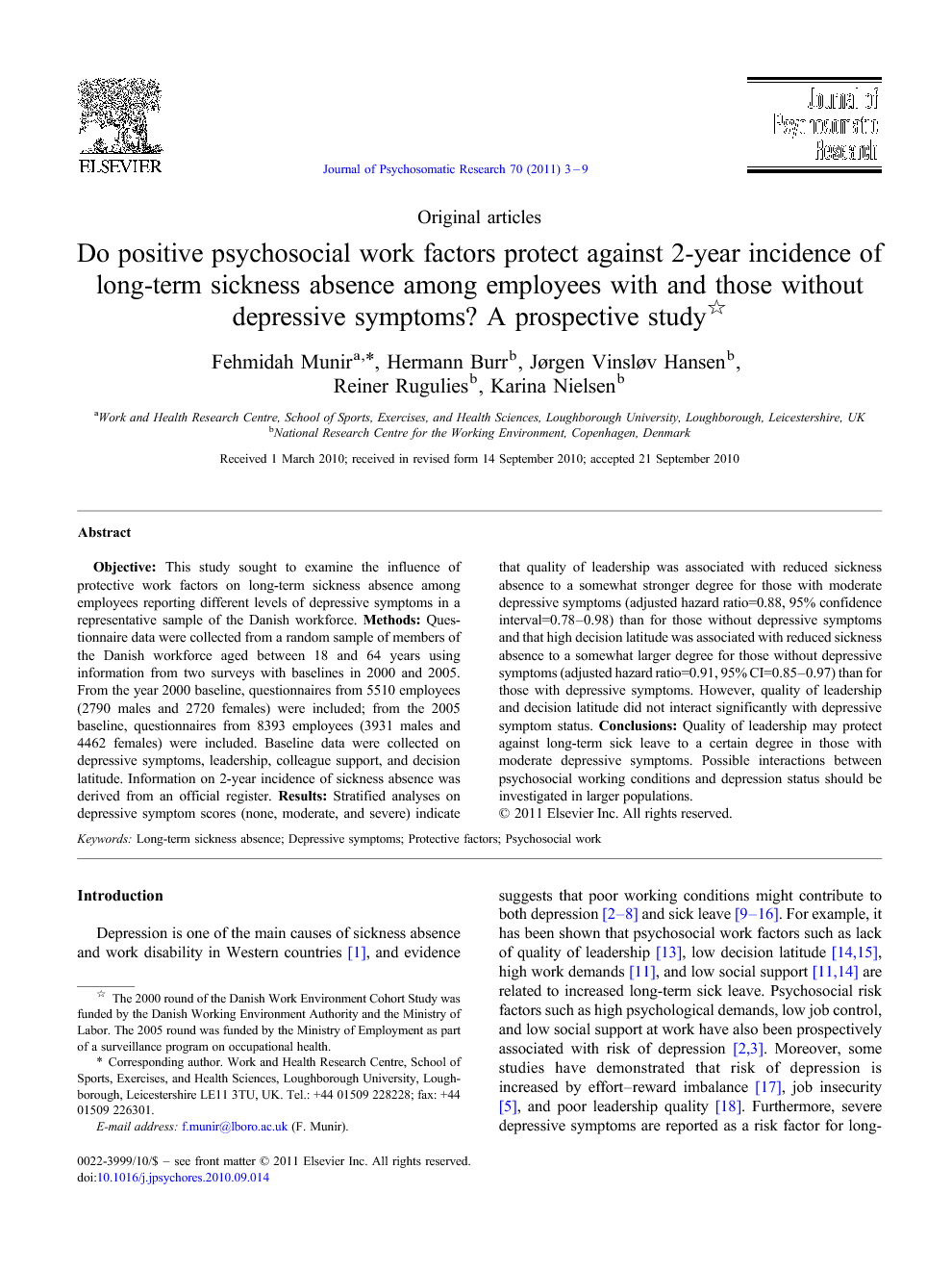انگیختگی ادراکی ایجاد حافظه های جدید اپیزودیک را بهبود می بخشد
| کد مقاله | سال انتشار | تعداد صفحات مقاله انگلیسی |
|---|---|---|
| 34635 | 2011 | 7 صفحه PDF |

Publisher : Elsevier - Science Direct (الزویر - ساینس دایرکت)
Journal : Journal of Psychosomatic Research, Volume 70, Issue 1, January 2011, Pages 3–9
چکیده انگلیسی
Objective This study sought to examine the influence of protective work factors on long-term sickness absence among employees reporting different levels of depressive symptoms in a representative sample of the Danish workforce. Methods Questionnaire data were collected from a random sample of members of the Danish workforce aged between 18 and 64 years using information from two surveys with baselines in 2000 and 2005. From the year 2000 baseline, questionnaires from 5510 employees (2790 males and 2720 females) were included; from the 2005 baseline, questionnaires from 8393 employees (3931 males and 4462 females) were included. Baseline data were collected on depressive symptoms, leadership, colleague support, and decision latitude. Information on 2-year incidence of sickness absence was derived from an official register. Results Stratified analyses on depressive symptom scores (none, moderate, and severe) indicate that quality of leadership was associated with reduced sickness absence to a somewhat stronger degree for those with moderate depressive symptoms (adjusted hazard ratio=0.88, 95% confidence interval=0.78–0.98) than for those without depressive symptoms and that high decision latitude was associated with reduced sickness absence to a somewhat larger degree for those without depressive symptoms (adjusted hazard ratio=0.91, 95% CI=0.85–0.97) than for those with depressive symptoms. However, quality of leadership and decision latitude did not interact significantly with depressive symptom status. Conclusions Quality of leadership may protect against long-term sick leave to a certain degree in those with moderate depressive symptoms. Possible interactions between psychosocial working conditions and depression status should be investigated in larger populations.
مقدمه انگلیسی
Depression is one of the main causes of sickness absence and work disability in Western countries [1], and evidence suggests that poor working conditions might contribute to both depression [2], [3], [4], [5], [6], [7] and [8] and sick leave [9], [10], [11], [12], [13], [14], [15] and [16]. For example, it has been shown that psychosocial work factors such as lack of quality of leadership [13], low decision latitude [14] and [15], high work demands [11], and low social support [11] and [14] are related to increased long-term sick leave. Psychosocial risk factors such as high psychological demands, low job control, and low social support at work have also been prospectively associated with risk of depression [2] and [3]. Moreover, some studies have demonstrated that risk of depression is increased by effort–reward imbalance [17], job insecurity [5], and poor leadership quality [18]. Furthermore, severe depressive symptoms are reported as a risk factor for long-term sick leave [19] and disability pensioning [20], and a recent study has shown high job strain and low job control to be directly related to long-term sick leave among those with depression [12]. Relatively little is known about the effects of positive psychosocial work factors on depressive symptoms and absence. The notion “positive psychosocial factors” is an approach to examining psychosocial work factors in a more positively orientated way that allows for more focused theory building and application of positive traits, behaviors, and work characteristics toward mental “wellness” [21] and [22]. It could be argued that positive psychosocial factors are a reversal of the negative ones; however, it is unlikely that the same mechanisms that underlie employee ill-health also represent employee health and well-being [23]. Evidence for this comes from studies that have demonstrated that positive psychosocial factors can make a unique contribution to explaining variance in employee health outcomes over and above negative ones [23]. Thus, there is now an increasing, albeit slow, shift toward considering the influence of positive work factors on mental wellness [23] and [24]. Researchers now advocate that it is important to identify the protective or positive work factors that can influence sickness absence and poor health so that they can be targeted as potential interventions [25]. To our knowledge, no studies have investigated if certain positive aspects of the psychosocial environment, such as good leadership quality, high social support, and high decision latitude, protect against long-term sick leave among individuals with different levels of depression (e.g., moderate vs. high). In recent years, there has been increasing understanding of the impact that managers play in ensuring employee health and well-being. Good leadership quality has been found to be related to increased psychological well-being and decreased sickness absence [26]. A recent study found that leaders that employ a visionary and supportive leadership style may reduce depressive symptoms in their employees [27]. Both line manager support and co-worker support have been linked to reduced risk for depressive symptoms [2] and shown to be protective against psychiatric sickness absence [28]. High levels of decision latitude are also reported to be protective of mental health [4]. Warr [29] argued that individuals react differently to psychosocial work factors based on their existing levels of mental health. It may be that employees with moderate to high levels of depression may react differently to protective work factors, which may, in turn, affect their absence behaviors differently. Therefore, the aim of our study was to examine the interactive effects of baseline leadership quality, social support, and decision latitude on one hand and none, moderate, and severe depressive symptoms on the other on subsequent long-term sick leave. More specifically, we predicted that individuals with depressive symptoms will have a reduced risk for long-term sick leave if they experience good social support from colleagues, good leadership quality, and high decision latitude.

